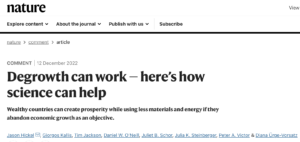Pure Communism Disguised as Economics.
By Charles Rotter
As the pushback against ESG grows louder, this tone-deaf and economically illiterate article pushing pure communism central economic control appears in Nature, with the title and tagline:
Degrowth can work — here’s how science can help
Wealthy countries can create prosperity while using less materials and energy if they abandon economic growth as an objective.
This article appears just as the pushback against ESG is gaining traction, with multiple US states divesting from ESG and ESG fund managers under investigation for breach of fiduciary duty.
…
The article in Nature is more sophomoric and naive than I would normally expect.
The global economy is structured around growth — the idea that firms, industries and nations must increase production every year, regardless of whether it is needed. This dynamic is driving climate change and ecological breakdown. High-income economies, and the corporations and wealthy classes that dominate them, are mainly responsible for this problem and consume energy and materials at unsustainable rates1,2.
Yet many industrialized countries are now struggling to grow their economies, given economic convulsions caused by the COVID-19 pandemic, Russia’s invasion of Ukraine, resource scarcities and stagnating productivity improvements. Governments face a difficult situation. Their attempts to stimulate growth clash with objectives to improve human well-being and reduce environmental damage.
Researchers in ecological economics call for a different approach — degrowth3. Wealthy economies should abandon growth of gross domestic product (GDP) as a goal, scale down destructive and unnecessary forms of production to reduce energy and material use, and focus economic activity around securing human needs and well-being. This approach, which has gained traction in recent years, can enable rapid decarbonization and stop ecological breakdown while improving social outcomes2. It frees up energy and materials for low- and middle-income countries in which growth might still be needed for development. Degrowth is a purposeful strategy to stabilize economies and achieve social and ecological goals, unlike recession, which is chaotic and socially destabilizing and occurs when growth-dependent economies fail to grow.
The paragraphs above take the myopic view that the problems they note are caused by economic growth and not the push for the opposite, sustainable development, unreliable power generation, as well as the disastrous response of governments around the world to Covid.
The article is not much more than a bulleted list of socialist demands. Since everything is a human right if they want it.
Here is a list of those points sans commentary.
- Reduce less-necessary production.
- Improve public services.
- Introduce a green jobs guarantee.
- Reduce working time.
- Enable sustainable development.
And here are their five key “research” “challenges”.
- Remove dependencies on growth
- Fund public services
- Manage working-time reductions
- Reshape provisioning systems
- Political feasibility and opposition
My favorite of the five was the first, remove dependencies on growth.
Economies today depend on growth in several ways. Welfare is often funded by tax revenues. Private pension providers rely on stock-market growth for financial returns. Firms cite projected growth to attract investors. Researchers need to identify and address such ‘growth dependencies’ on a sector-by-sector basis.
For example, the ‘fiduciary duty’ of company directors needs to be changed. Instead of prioritizing the short-term financial interests of shareholders, companies should prioritize social and environmental benefits and take social and ecological costs into account. Sectors such as social care and pensions need secure funding mechanisms for public providers, and better regulation and dismantling of perverse financial incentives for private providers4.
Balancing the national economy will require new macro-economic models that combine economic, financial, social and ecological variables. Models such as LowGrow SFC (developed by T.J. and P.A.V.), EUROGREEN and MEDEAS are already being used to project the impacts of degrowth policies, including redistributive taxes, universal public services and reductions in working time.
So, ESG, wealth distribution, and central economic planning and control. Yeah, that’s the ticket.
I have two questions for anyone that claims to be opposed to the concept of economic growth.
Have you ever received a pay raise?
Are you willing to forego any future pay raises?
If you have a strong stomach you can read this complete indictment of the modern education system here.
HT/Cam_S
Eric Worrall – Charles invited me to add an addendum.
It is not just pay rises zero growth participants would miss.
Most of us change jobs at least a few times in our lives, but changing job is very much an integral part of economic growth. If you move to a better paid job, the better pay is only available because your new employer needs you more than your old employer, and is prepared to pay more for your services. Moving resources from low value uses to high value uses is the very definition of capitalist wealth creation, including when those resources happen to be people moving jobs. Wealth creation is the engine which drives economic growth.
But maybe we wouldn’t want to change jobs, if every job was already perfect.
Zero economic growth and everyone’s needs fulfilled conjures a momentary vision in my mind of The Shire, the idyllic home of the Hobbits in The Lord of the Rings. A seductive vision of everyone happily working, but not too hard, having a beer at the pub at the end of the day, belonging to the group and village, and trying to work up the courage to ask out that sexy barmaid.
Then reality sets in and the idyllic vision is banished, because the reality to date has always been very different.
Every time zero growth has been attempted on a large scale, the result has always been thousands or even millions of deaths. One of the worst recent examples, the end result of Pol Pot’s attempt to return Cambodia to idyllic agrarian bliss was mountains of skulls – an estimated 1.5 – 3 million people died during Pol Pot’s year zero experiment.

The researchers pushing zero growth seem to be claiming their economic models will help them get it right this time, but the risk of getting it wrong, and the horrific consequences of getting it wrong, are a strong argument for caution.

Some groups who attempt living a simple life have had less horrible outcomes, but the distinguishing feature of the groups which make it work and avoid committing mass murder appears to be that they don’t have locks on the compound gates. People are free to leave, if they find the life doesn’t suit them.
For example, as a student I used to love eating at Hare Krishna restaurants, which were supplied by communal farms and funded by donations.
I never had any urge to join their group, but they were very gentle about proselytisation, at least that was my experience. Working on my uncle’s Christmas Tree farm with hand tools was a great vacation job, but I learned first hand how hard farming can be – so I knew even as a student, this wasn’t the life I wanted.
Not everyone is like me, there are plenty of people who do enjoy a life focussed on goals other than economic growth, who spend many years, maybe even their whole life, living and working in agrarian communes.
So here’s a suggestion – if researchers are so sure of their economic models, why don’t they try to put them into practice on a smaller scale? A self governing Hare Krishna style commune operating on modern zero growth economic models, which trades with the outside economy for materials they can’t source for themselves would be a great small scale test of their theories.
I’m not being facetious, I would be deeply interested in the outcome of such an experiment. I’d probably even want to visit, maybe even stay for a few nights. But I doubt I’d want to live that way for the rest of my life – unless they really do get it right, and find a way to satisfy the needs of everyone, including a hardline capitalist like me.
#
Related Links:

Marc Morano comments: My new book Green Fraud devotes an entire chapter to how climate activists praise COVID lockdowns and are seeking climate lockdowns and “planned recessions’ and Degrowth to fight global warming.





